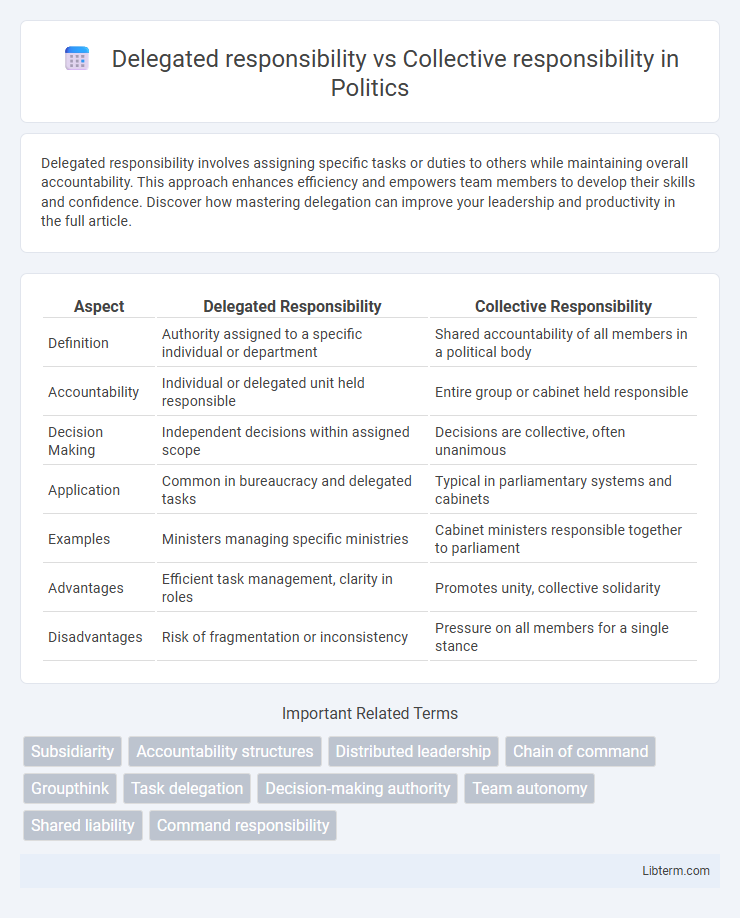Delegated responsibility involves assigning specific tasks or duties to others while maintaining overall accountability. This approach enhances efficiency and empowers team members to develop their skills and confidence. Discover how mastering delegation can improve your leadership and productivity in the full article.
Table of Comparison
| Aspect | Delegated Responsibility | Collective Responsibility |
|---|---|---|
| Definition | Authority assigned to a specific individual or department | Shared accountability of all members in a political body |
| Accountability | Individual or delegated unit held responsible | Entire group or cabinet held responsible |
| Decision Making | Independent decisions within assigned scope | Decisions are collective, often unanimous |
| Application | Common in bureaucracy and delegated tasks | Typical in parliamentary systems and cabinets |
| Examples | Ministers managing specific ministries | Cabinet ministers responsible together to parliament |
| Advantages | Efficient task management, clarity in roles | Promotes unity, collective solidarity |
| Disadvantages | Risk of fragmentation or inconsistency | Pressure on all members for a single stance |
Understanding Delegated Responsibility
Delegated responsibility involves assigning specific tasks or authority from a higher level of management to subordinate individuals or teams, ensuring clarity in roles and accountability. This approach enhances efficiency by empowering employees to make decisions within their designated scope while maintaining oversight through clear communication channels. Understanding delegated responsibility is crucial for optimizing organizational structure and improving operational effectiveness through defined delegation processes.
Defining Collective Responsibility
Collective responsibility refers to the obligation shared by all members of a group or organization to uphold decisions, policies, or actions, regardless of individual opinions or roles. This concept is crucial in parliamentary systems, ensuring unity and accountability among cabinet members for government decisions. Unlike delegated responsibility, where specific tasks are assigned to individuals, collective responsibility emphasizes joint accountability and solidarity in decision-making processes.
Key Differences Between Delegated and Collective Responsibility
Delegated responsibility assigns specific tasks or authority to an individual or subgroup, ensuring accountability lies with the delegatee, while collective responsibility holds the entire group or team accountable for decisions and outcomes, regardless of individual roles. Delegated responsibility emphasizes clear authority and personal accountability, often seen in organizational hierarchies, whereas collective responsibility fosters unity and shared ownership, commonly practiced in parliamentary systems and collaborative teams. The key difference lies in the distribution of accountability: delegated responsibility is individual-focused, whereas collective responsibility is group-focused.
Advantages of Delegated Responsibility
Delegated responsibility enhances organizational efficiency by distributing tasks to specialized individuals, ensuring accountability and faster decision-making. It fosters employee empowerment and skill development, leading to increased motivation and innovation within teams. Clear delegation reduces managerial overload and improves resource allocation, driving overall productivity and operational success.
Benefits of Collective Responsibility
Collective responsibility fosters team cohesion by ensuring all members share accountability for successes and failures, which strengthens collaboration and trust. It encourages diverse perspectives and joint problem-solving, leading to more innovative and effective decisions. This approach also enhances organizational resilience, as collective ownership motivates continuous improvement and adaptive learning across the group.
Challenges in Delegating Responsibility
Delegating responsibility often faces challenges such as unclear communication of expectations, inadequate training, and reluctance to relinquish control, which can lead to reduced accountability and inefficiencies. The risk of misaligned objectives between delegator and delegatee complicates task execution and can cause conflicts or delays in project milestones. Effective delegation requires structured frameworks and continuous feedback mechanisms to overcome these issues and ensure successful task completion.
Risks and Limitations of Collective Responsibility
Collective responsibility can lead to diffusion of accountability, where individual members avoid ownership of decisions, increasing the risk of poor outcomes. It may also result in groupthink, limiting critical evaluation and stifling dissenting opinions essential for innovation. Furthermore, collective responsibility can delay decision-making processes due to the need for consensus, reducing organizational agility in rapidly changing environments.
Real-world Examples of Delegated Responsibility
In corporate environments, delegated responsibility allows managers to assign decision-making authority to team leaders, enhancing efficiency and accountability. For example, in multinational companies like Google, project managers are empowered to make budgetary and staffing decisions within their units, streamlining operations and fostering innovation. Governments also practice delegated responsibility by empowering local agencies to implement national policies, as seen in the decentralization of public health measures during the COVID-19 pandemic.
Case Studies Illustrating Collective Responsibility
Case studies illustrating collective responsibility often involve organizational or governmental failures where accountability is shared among all members, such as the 2008 financial crisis, where multiple institutions and regulators failed to prevent systemic collapse. In the Deepwater Horizon oil spill, collective responsibility was evident as the involved companies and regulatory bodies were held jointly accountable for environmental damage and safety oversights. These examples highlight how collective responsibility distributes accountability across entire groups rather than isolating individual fault, contrasting with delegated responsibility where specific tasks and liabilities are assigned to individuals or departments.
Choosing the Right Approach for Your Organization
Choosing the right approach between delegated responsibility and collective responsibility depends on your organization's size, culture, and decision-making style. Delegated responsibility empowers specific individuals or teams with clear accountability, enhancing efficiency and expertise in complex tasks. Collective responsibility fosters collaboration and shared ownership, ideal for innovation-driven environments requiring diverse input and consensus.
Delegated responsibility Infographic

 libterm.com
libterm.com